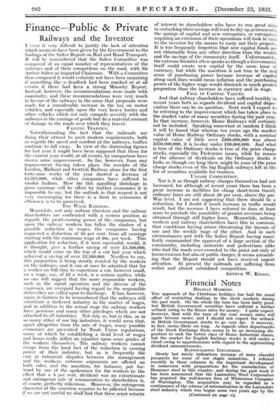THE WAGE EARNERS.
Meanwhile, not only railway directors and the railway shareholders are confronted with a serious position as regards the profit-earning power of the companies, but upon the railway workers has fallen the shadow of a possible reduction in wages, the companies having requested a deduction of 10 per cent, from all earnings starting with the minimum wage of 38s. per week. This application for reduction, if it were successful, would, it is thought, give a further saving of over /4,500,000, which would come on the top of a cut last year which achieved a saving of over 13,500,000. Needless to say, this proposition is being stoutly resisted by the workers on the railways, and it can at once be admitted that for a worker, on full time to experience a cut, however small, on a wage, say, of 12 a week, is a serious matter, while no one will suggest that the more responsible workers, such as the signal operators and the drivers of the expresses, are overpaid having regard to the responsible duties they are called upon to discharge. It has, however, again in fairness to be remembered that the railways still constitute a sheltered industry in the matter of wages, and in addition to the actual wage the railway workers have pensions and many other privileges which are not attached to all industries. Not only so, but in this, as in so many other of our big industries, it would seem that, apart altogether from the rate of wages, many possible economies are prevented by Trade Union regulations, many of which by establishing a dead level of wages and hours really inflict an injustice upon some grades of the workers themselves. The railway workers cannot escape from the hard fact of the reduction in earning power of their industry, but as is frequently the ease in industrial disputes between the management and the workers, extreme arguments are offered on both sides, and the assertion, for instance, put for- ward by one of the spokesmen, for the workers to the effect that a 4 per 'cent, dividend was an extortionate and outrageous rate of remuneration to shareholders is, of course, perfectly ridiculous. Moreover, the outrageous character of the assertion requires to be pilloried because if we are not careful we shall find that these scant returns of interest to shareholders who have to run great risks in embarking their savings will tend to dry up permanently the springs of capital and new enterprises, or enterprises requiring an extension of their operations will look in vain to the investor for the means to carry out their projects. It is too frequently forgotten that new capital funds are not obtainable from any other direction than the wealth and. the savings of the community itself. Unfortunately, the extreme Socialist often speaks as though a Government itself could create new capital by the mere issue of currency, but while the assertion is not true in the real sense of purchasing power because increase of capital along such lines would mean inflation and the purchasing power of the higher wage would diminish in much greater proportion than the increase in currency and in wage.


























 Previous page
Previous page